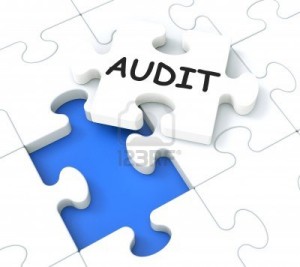Audit and Auditing:
Audit is defining as to conduct an official financial inspection of a Company or its account.
Auditing may also define as
A fair examination and evaluation of the financial statements of an organization. It can be done internally by employees of the organization or externally by an outside firm.
According to international auditing practices committee:
“An audit is the independent examination of financial information of any entity, whether profit oriented or not and irrespective of its size or legal form when such as examination conducted with a view to expressing an opinion thereon”.
It is clear that auditing is an independent checking of the statement, records, and performance of a concern with a view to expressing an opinion in the form of written report.
In simple words, we say that an auditing is the examination of the financial report of an organization.
The financial report includes a balance sheet, an income statement, a statement of changes in equity, a cash flow statement.

An auditor whose job it is to carefully check the accuracy of business records. An auditor can be either an independent auditor unaffiliated with the company being audited or a captive auditor, and some are elected public officials.
You May also Read to Like:
Kinds of Audit:
There are difference kinds of Audit, these are discussed below.
External Audit:
External audit, also known as financial audit and statutory audit, involves the examination of the truth and fairness of the financial statements of an entity by an external auditor who is independent of the organization in accordance with a reporting framework.
The need for an external audit primarily stems from the separation of ownership and control in large companies in which shareholders nominate directors to run the affairs of the company on their behalf. As the directors report on the financial performance and position of the company, shareholders need assurance over the accuracy of the financial statements before placing any reliance on them.
An external audit provides reasonable assurance to the owners of the company that the financial statements, as reported by the directors, are free from material misstatements.
External auditors are required to comply with professional auditing standards such as the International Standards on Auditing and ethical guidelines such as those issued by IFAC in order to maintain a level of quality and trust of all stakeholders in the auditing exercise.
Internal Audit:
Internal audit also referred as operational audit, is a voluntary appraisal activity undertaken by an organization to provide assurance over the effectiveness of internal controls, risk management, and governance to facilitate the achievement of organizational objectives.
Internal audit is performed by employees of the organization who report to the audit committee of the board of directors as opposed to external audit which is carried out by professionals independent of the organization and who report to the shareholders via audit report.
Public Sector:
State-owned companies and institutions are required by law in several jurisdictions to have their affairs examined by a public sector auditor. In many countries, public sector audits are conducted under the supervision of the auditor general which is an institute responsible for strengthening public sector accountability and governance and promoting transparency.
Public sector audit involves the scrutiny of the financial affairs of the state-owned enterprises to assess whether they have been operated in a way which is in the best interest of the public and whether standard procedures have been followed to comply with the requirements in place to promote transparency and good governance (e.g. public sector procurement rules). Public sector audit, therefore, goes a step further than the financial audit of private organizations which primarily focuses on the reliability of financial statements.
Tax:
Tax audits are conducted to assess the accuracy of the tax returns filed by a company and are therefore used to determine the amount of any over or under assessment of tax liability towards the tax authorities.
In some jurisdictions, companies above a certain size are required to have tax audits after regular intervals while in other jurisdictions random companies are selected for tax audits through the operation of a balloting system.
Characteristic of Auditing:
1.Financial information:
Audit refers to financial information of a business concern, the book of accounts and financial information provide data about the business. The auditor examines such information to test the validity of data.
2.Business setup for Profit:
The audit is essential for the business set up for profit in private sector. Proprietorship, partnership, and companies are working for profit, the audit is compulsory for companies and it is optional for other businesses.
3.Entity:
Audit deals with an entity enterprise concern, agency or company, all aspects of entity relevant to financial statements are covered by the audit.
4.Independent Examination:
An auditor must be independent in fact and appearance. He is independent if he is not an employee.
5.Expressing opinion:
The audit is conducted for expressing an opinion on financial information. The auditor can express an opinion whether financial statement gives a true and fair view and comply with relevant laws.
